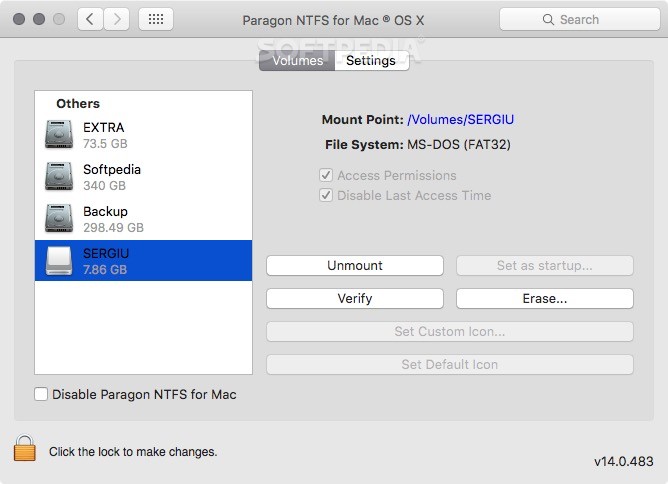

- Download paragon ntfs for mac os x drivers#
- Download paragon ntfs for mac os x driver#
- Download paragon ntfs for mac os x Patch#
There is also a Linux kernel option called lazytime to reduce the writes on file access.
Download paragon ntfs for mac os x Patch#
A patch is available to use an even larger block. This is in fact a solution recommended by Tuxera. Using a larger block means fewer context switches. The underlying FUSE layer has an option called big_writes to use larger blocks when writing.Some open-source methods provided to reduce this overhead include: The slowness of NTFS-3G (and FUSE in general) on embedded systems is attributed to the frequent context switching associated with FUSE calls.
Download paragon ntfs for mac os x driver#
Tuxera sells optimized versions of the driver that claims to have improved CPU utilization for embedded systems and MacOS. On embedded or old systems, the high processor usage can severely limit performance.
Download paragon ntfs for mac os x drivers#
Performance īenchmarks show that the driver's performance via FUSE is comparable to that of other filesystems' drivers in-kernel, provided that the CPU is powerful enough. The ‘norecover’ mount option can be used to disable this behavior. As of 2009, a volume having an unclean journal file is recovered and mounted by default. NTFS-3G supports partial NTFS journaling, so if an unexpected computer failure leaves the file system in an inconsistent state, the volume can be repaired.

A "usermap" utility is included to record the mapping from UIDs to Windows NT SIDs. NTFS-3G provides complete support and translation of NTFS access control list (ACL) to POSIX ACL permissions. With the help of NTFS reparse point plugins, it can be made to read chunk-deduplicated files, system-compressed files, and OneDrive files. NTFS-3G supports hard links, symbolic links, and junctions. NTFS partitions are mounted using the Filesystem in Userspace (FUSE) interface.

Support to modify access control lists and permissions is available. Transparent compression is supported, as well as system-level encryption. NTFS-3G supports all operations for writing files: files of any size can be created, modified, renamed, moved, or deleted on NTFS partitions. NTFS-3G is now the free "community edition", while Tuxera NTFS is the proprietary version. The developers of NTFS-3G later formed a company, Tuxera Inc., to further develop the code. The first stable version was released on February 21, 2007, as version 1.0. NTFS-3G was introduced by one of the senior Linux NTFS developers, Szabolcs Szakacsits, in July 2006. It is a partial fork of ntfsprogs and is under active maintenance and development. It is licensed under the GNU General Public License. It is runnable on Linux, FreeBSD, NetBSD, OpenSolaris, illumos, BeOS, QNX, WinCE, Nucleus, VxWorks, Haiku, MorphOS, Minix, macOS and OpenBSD. NTFS-3G often uses the FUSE file system interface, so it can run unmodified on many different operating systems. NTFS-3G is an open-source cross-platform implementation of the Microsoft Windows NTFS file system with read/write support.


 0 kommentar(er)
0 kommentar(er)
